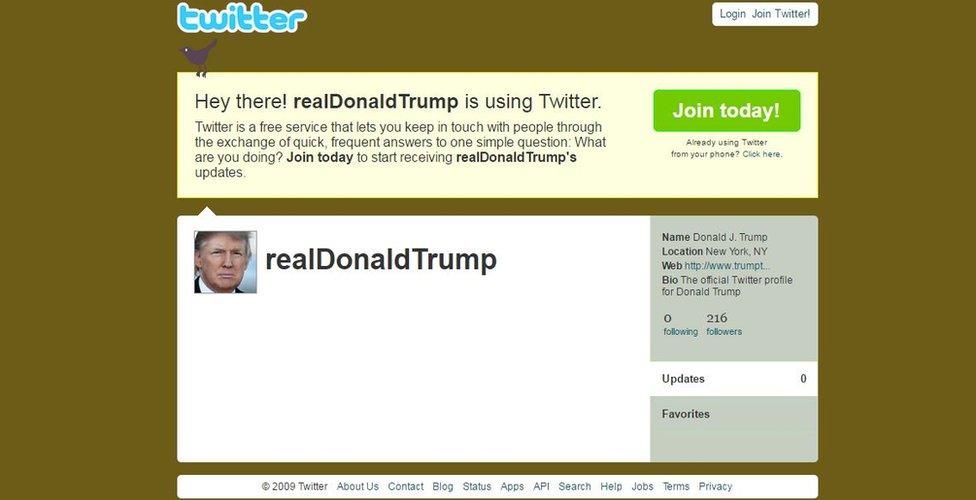Trump on Twitter: A history of the man and his medium
- Published

Trump's Twitter page in April 2009
Donald Trump's Twitter account wasn't always the powerful spectacle it has become. Journalist Adam Harris goes through the archives to see how it evolved.
In the month since the election, Mr Trump has taken to Twitter to lambast what he views as unfavourable media coverage, rail against corporations who might take jobs overseas and defend his phone calls with international leaders.
Journalists and pundits are still trying to discover if there is a method to Mr Trump's Twitter madness. We looked at his seven-year Twitter history to see what could be learned.
His interaction with Twitter began much like any other high profile account managed by a group of marketing professionals.
In May 2009, Mr Trump, then a private businessman, sent his first tweet promoting a forthcoming appearance on the Late Show with David Letterman.
At the time, Peter Costanzo, a marketing staffer at his publishing company, suggested a social media push for Mr Trump's book, Think Like a Champion. Someone had been sending out parody tweets under the @DonaldTrump hashtag, and so the businessman took @RealDonaldTrump, Costanzo told journalist Jacob Weisberg on
There were tweets about The Apprentice, his appearances, family milestones and quotes from Mr Trump himself. The tweets directly from him were usually tagged "from Donald Trump," but rarely veered into politics.
By June 2011, tweets no longer acknowledged whether they were directly from Mr Trump or originated with his team and the lines between his businesses and political pursuits began to blur.
Mr Trump began criticising Republicans for plans to and President Barack Obama for Obamacare, spending and . He "China is our enemy, they want to destroy us."
There was also a shift in how often the President-elect tweeted. From May 2009 until the end of May 2011, it was slightly more than 275 times.
He more than doubled that in the last six months of 2011, with his Twitter output accelerating from nearly 150 tweets a year to more than 100 tweets a month.
In 2016, he averaged 375 tweets a month through to the end of November, according to TrumpTwitterArchive.com, a searchable database dedicated to cataloguing all of Mr Trump's tweets.
Tweets and retweets
Mr Trump announced his candidacy for the president of the United States in on 16 June 2015. Ahead of his announcement, he retweeted more than a dozen tweets the idea of a .
Employing a now-outdated form of retweeting, which places quotes around the text you wish to share, Trump has manually retweeted other accounts roughly 10,000 times.
In 2015, staffers at Gawker Media that tweeted Benito Mussolini quotes and attributed them to Mr Trump, who in February
In January, Mr Trump "WhiteGenocideTM," whose profile linked to a website containing a pro-Adolf Hitler documentary and whose Twitter feed "was largely a collection of retweets about violence allegedly committed by African-American suspects and anti-Arab posts," according to CNN.
He faced an almost immediate backlash, but did not delete the tweet, which attacks former Republican rival Jeb Bush.
Less than a month later, Mr Trump again retweeted "WhiteGenocideTM." The tweet read, "You always have the best crowds. #MakeAmericaGreatAgain," and was .
Mr Trump recently retweeted several fans who were mocking CNN reporter Jeff Zeleny.
One of those fans, , tweeted, "@jeffzeleny Pathetic — you have no sufficient evidence that Donald Trump did not suffer from voter fraud, shame! Bad reporter"
Early in 2015, Mr Trump was asked by a reporter whether .
"I do retweets, and I mean, to a certain extent, I do, yeah. I think that's right. Do you want me to say no? You know, I retweet, I retweet for a reason," he said.
Methods to his medium
But Mr Trump still prefers tweets to more traditional media - he hasn't held a press conference since 27 July. Although he has only given a handful of interviews since being elected, he has tweeted more than 130 times about topics ranging from the to to .
Indeed, Mr Trump does favour tweets over contact with the press - a policy he tweeted out, of course.
"If the press would cover me accurately & honourably," he tweeted on Monday, "I would have far less reason to 'Tweet'."
On the other hand, his tweets appear to be influenced by the media - his tweet that said flag burners should be jailed came roughly 30 minutes after Fox News ran a story on flag burners.
And on 29 November, Mr Trump tweeted that Green Party nominee Jill Stein's recount effort was a "scam", joined by "badly defeated" Democrats. The tweet, however, followed a Fox News segment reporting that the Clinton campaign would join the recount efforts in Michigan, Pennsylvania and Wisconsin.
Real-life impact
As the President-elect, Mr Trump's tweets have added import.
On Tuesday, Mr Trump criticised Boeing for the price tag associated with the manufacture of Air Force One, which he said would cost taxpayers $4bn. The company saw a near immediate dent in its share prices, but recovered after revealing that it does not yet have the contract to build it. Instead it has a development deal with the government.
"We are currently under contract for $170 million to help determine the capabilities of these complex military aircraft that serve the unique requirements of the President of the United States," said Boeing spokesman Todd Belcher in a statement.
"We look forward to working with the US Air Force on subsequent phases of the programme allowing us to deliver the best planes for the president at the best value for the American taxpayer."
It took six years after being inaugurated for Mr Obama to give up his Blackberry.
According to senior advisor Kellyanne Conway, who spoke during in an interview with Jake Tapper, it is still undecided whether Trump will continue to have personal access to his Twitter account when he assumes office.